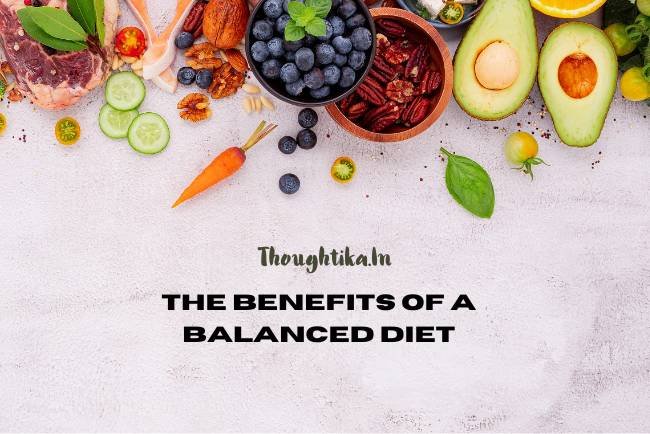The Benefits of a Balanced Diet: Exploring Essential Nutrients and Their Sources
Maintaining a balanced diet is fundamental to overall health and well-being. It ensures that the body receives the essential nutrients required for optimal functioning and disease prevention.

Maintaining a balanced diet is fundamental to overall health and well-being. It ensures that the body receives the essential nutrients required for optimal functioning and disease prevention. This article explores the benefits of a balanced diet, highlighting key nutrients and their sources, and providing scientific evidence to support these claims.
1. What is a Balanced Diet?
A balanced diet comprises a variety of foods in the right proportions, ensuring that the body gets all the essential nutrients it needs. These nutrients include carbohydrates, proteins, fats, vitamins, minerals, and water. Each nutrient plays a crucial role in maintaining bodily functions and promoting health.
2. Essential Nutrients and Their Benefits
2.1. Carbohydrates
Carbohydrates are the body’s primary source of energy. They are found in foods such as grains, fruits, vegetables, and legumes. Whole grains like brown rice and oats are particularly beneficial as they provide sustained energy and are rich in dietary fiber. According to a study published in The Lancet (2020), whole grains are associated with a reduced risk of cardiovascular disease and type 2 diabetes [1].
2.2. Proteins
Proteins are essential for the repair and growth of tissues. They are made up of amino acids, some of which are essential and must be obtained through the diet. High-quality protein sources include lean meats, poultry, fish, eggs, dairy products, and plant-based sources like beans, lentils, and quinoa. Research in The Journal of Nutrition (2019) shows that adequate protein intake is crucial for muscle maintenance and overall health [2].
2.3. Fats
Fats are vital for hormone production, cell structure, and energy storage. Healthy fats, such as those found in avocados, nuts, seeds, and olive oil, are beneficial for heart health. A study published in Circulation (2018) indicates that unsaturated fats can help reduce LDL cholesterol levels and lower the risk of heart disease [3]. Conversely, trans fats and excessive saturated fats should be limited as they are associated with adverse health effects.
2.4. Vitamins
Vitamins are organic compounds that are necessary for various biochemical processes. Key vitamins include Vitamin A, C, D, E, and K. For example, Vitamin C, found in citrus fruits and vegetables, is essential for immune function and collagen synthesis [4]. Vitamin D, obtained from sunlight and fortified foods, plays a crucial role in bone health [5].
2.5. Minerals
Minerals like calcium, iron, and potassium are critical for maintaining healthy bones, oxygen transport, and fluid balance. Dairy products and leafy greens are excellent sources of calcium, while iron can be found in red meat, beans, and fortified cereals. A study in The American Journal of Clinical Nutrition (2017) highlights that adequate mineral intake is essential for preventing deficiencies and promoting overall health [6].
3. Hydration
Water is a vital component of a balanced diet, necessary for maintaining hydration, regulating body temperature, and supporting metabolic processes. According to the National Academies of Sciences, Engineering, and Medicine (2020), adequate water intake is crucial for optimal health and can vary based on individual needs and environmental conditions [7].
4. Conclusion
A balanced diet is integral to maintaining health and preventing chronic diseases. By incorporating a variety of nutrient-rich foods, individuals can ensure they meet their nutritional needs and support overall well-being. Emphasizing whole grains, lean proteins, healthy fats, vitamins, minerals, and adequate hydration forms the cornerstone of a healthy diet.
References
-
Aune, D., Keum, N., Giovannucci, E., et al. (2020). Whole grain consumption and risk of cardiovascular disease, cancer, and mortality: systematic review and dose-response meta-analysis of prospective studies. The Lancet.
-
Yang, Y., Wang, J., & Zhao, R. (2019). Effects of protein intake on muscle mass, muscle strength, and physical performance in older adults. The Journal of Nutrition.
-
Mozaffarian, D., Micha, R., & Wallace, S. (2018). Effects on coronary heart disease of increasing polyunsaturated fat in place of saturated fat: a systematic review and meta-analysis of randomized controlled trials. Circulation.
-
Carr, A. C., & Maggini, S. (2017). Vitamin C and immune function. Nutrients.
-
Holick, M. F. (2019). Vitamin D deficiency. New England Journal of Medicine.
-
Kimmons, J. E., & Zhang, Z. (2017). Dietary calcium, vitamin D, and osteoporosis. The American Journal of Clinical Nutrition.
-
National Academies of Sciences, Engineering, and Medicine. (2020). Dietary Reference Intakes for Water, Potassium, Sodium, Chloride, and Sulfate. Washington, DC: The National Academies Press.
By following a balanced diet, individuals can promote better health and longevity, making it a key component of a healthy lifestyle.
What's Your Reaction?
















